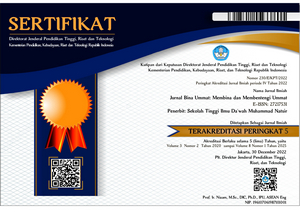COMMUNITY SATISFACTION INDEX (CSI) ON STUDENTS� DA�WAH PRACTICUM PROGRAM AT CIPAYUNG, EAST JAKARTA
DOI:
https://doi.org/10.38214/jurnalbinaummatstidnatsir.v8i1.325Abstract
This study aims to determine the Community Satisfaction Index (CSI) on Students Dawah Practicum Program at Cipayung, Jakarta Timur. This program is conducted by STID Mohammad Natsir in partnership with Taman Pendidikan AL Quran (TPA in Cipayung, Jakarta Timur. The research approach used descriptive quantitative. The results of the study showed that the average score of community satisfaction with the assistance carried out by STID Mohammad Natsir students in Dawah Practicum Program was good with a scale of 3.975 and a conversion score of 79.506. The indicator of satisfaction is seen from five aspects, namely tangibles, an average score of 4.296 equivalent to 85.913 is at a very good level; empathy was 3.775 equivalent to 75.507 and was good; Reliability indicator had an average score of 3.832 equivalent to 76.630 and was good; responsiveness indicator had an average score of 3.887 equivalent to 77.739 and was good; the last, assurance indicator had an average score of 4.087 equivalent to 81.739 and was good level. From the score of the five aspects, the Community Satisfaction Index (CSI) score was78.98, with a scale conversion of 3.949. From these results, it is concluded that student assistance in Dawah Practicum Program received a good response from the community. This already good response needs to be improved so that the level of satisfaction of partner institutions will continue to rise.
Published
Issue
Section
This work is licensed under a Lisensi Creative Commons Atribusi 4.0 Internasional.
Authors who publish with this journal agree to the following terms:
- Authors retain copyright and grant the journal right of first publication with the work simultaneously licensed under a�Creative Commons Attribution License that allows others to share the work with an acknowledgment of the work's authorship and initial publication in this journal.
- Authors are able to enter into separate, additional contractual arrangements for the non-exclusive distribution of the journal's published version of the work (e.g., post it to an institutional repository or publish it in a book), with an acknowledgment of its initial publication in this journal.
- Authors are permitted and encouraged to post their work online (e.g., in institutional repositories or on their website) prior to and during the submission process, as it can lead to productive exchanges, as well as earlier and greater citation of published work (See�The Effect of Open Access).



